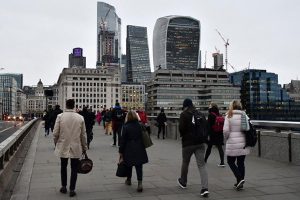Bloomberg
UK economic growth is grinding to a halt as the cost of the living crisis escalates, a leading business lobby warned.
The British Chambers of Commerce (BCC) predicted output will be barely higher in the fourth quarter than it was at the end of 2021, with consumers and businesses set to rein in spending as taxes climb and inflation rises
towards 10%.
In a report published, the BCC said it sees the economy stagnating in the second and third quarters, and contracting slightly in the final three months of the year. For 2023 as a whole, GDP will grow just 0.6%, it said.
The grim outlook will add to fears that the UK is at risk of falling into recession as soaring prices eat into living standards for households and drive up the costs that companies have to absorb.
Inflation hit a 40-year high of 9% in April and the rate is expected to peak in October, when a further sharp rise in energy bills is projected.
“Our latest forecast indicates that the headwinds facing the UK economy show little sign of reducing, with continued inflationary pressures and sluggish growth,†said Alex Veitch, director of policy at the BCC, which represents tens of thousands of firms that together employ 6 million people.
The forecasts are more downbeat than the average. On balance, economists surveyed by Bloomberg last month expected growth to resume in the second half following a stagnant second quarter.
The BCC said consumer spending and business investment are set to grow less this year than previously forecast, and barely expand at all in 2023. Veitch said the downgrade to corporate spending was “especially concerning†and urged the government to take urgent action to incentivise investment.
Recession worries persist
A slowdown in UK growth was less severe than feared in May, but firms remain worried about soaring costs and the risk of a recession, according to S&P Global.
The group’s index of private-sector growth fell to 53.1 last month, better than the 51.8 flash estimate released on May 24. That initial reading caused a sharp drop in the pound as traders reined in bets on the speed of Bank of England interest-rate hikes.
Still, the revision is unlikely to allay doubts on the overall path for growth. The reading was the worst since February 2021 as growth in new orders slowed and input-price inflation reached the highest on record.
The decline from 58.2 in April was also sharper than in any month on record prior to the coronavirus pandemic.
A separate reading for services came in at 53.4 — also above the initial estimate. Nonetheless, firm turned more pessimistic, saying they were concerned that the cost of living crisis was sapping consumer demand.
“May data illustrate a worrying combination of slower growth and higher prices across the UK service sector,†said Tim Moore, Economics Director at S&P Global Market Intelligence. “Growth expectations have dropped in each month since the invasion of Ukraine and are now the weakest since October 2020.â€
 The Gulf Time Newspaper One of the finest business newspapers in the UAE brought to you by our professional writers and editors.
The Gulf Time Newspaper One of the finest business newspapers in the UAE brought to you by our professional writers and editors.
